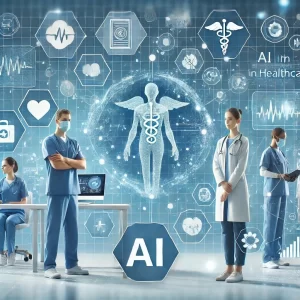?Artificial Intelligence (AI) is ushering in a transformative era in India’s healthcare sector, addressing longstanding challenges and introducing innovative solutions that enhance patient care and operational efficiency.?
Advancements in AI Applications
-
Diagnostic Precision: AI algorithms are revolutionizing diagnostics by analyzing complex medical data with remarkable accuracy. For instance, an NHS hospital in Chelsea and Westminster utilizes an AI tool called Derm to swiftly and autonomously diagnose skin cancer, providing immediate all-clear results to nearly half of the patients and significantly reducing waiting times.
-
Predictive Analytics: By scrutinizing patient histories and identifying patterns, AI enables healthcare providers to anticipate potential health issues, facilitating proactive interventions and personalized treatment plans.?
-
Operational Efficiency: AI streamlines administrative tasks such as scheduling and documentation, allowing healthcare professionals to devote more time to patient care, thereby enhancing overall efficiency.?
Challenges in AI Integration
-
Data Quality and Accessibility: The effectiveness of AI depends on high-quality data. Fragmented and inconsistent medical records can impede AI’s learning capabilities and accuracy.?
-
Infrastructure Constraints: Many healthcare facilities, particularly in rural areas, lack the necessary digital infrastructure to support seamless AI integration, limiting its widespread adoption.?
-
Skill Gap: There is a pressing need for professionals proficient in both healthcare and AI technologies to effectively implement and manage AI solutions.?
-
Ethical and Privacy Concerns: Ensuring patient data confidentiality and addressing potential biases in AI algorithms are critical to maintaining trust and equity in healthcare delivery.?
Impact on Patient Care
-
Enhanced Access: AI-powered telemedicine platforms bridge the gap for patients in remote areas, offering timely consultations and reducing the need for travel.?
-
Improved Outcomes: Accurate diagnostics and personalized treatment plans lead to better health outcomes, increasing patient satisfaction and trust in the healthcare system.?
-
Empowered Patients: AI-driven applications enable patients to monitor and manage their health proactively, fostering a more engaged and informed patient population.?
Hospital Enhancements
-
Resource Optimization: AI assists in efficient staff allocation and inventory management, reducing waste and improving service delivery.?
-
Clinical Decision Support: Real-time data analysis aids clinicians in making informed decisions, enhancing the quality of care provided.?
-
Accelerated Research: AI expedites drug discovery and clinical trials, fostering innovation and bringing new treatments to market more quickly.?
Economic Considerations
-
Initial Investment: Implementing AI requires substantial upfront investment in technology and training, which can be a barrier for some institutions.?
-
Long-Term Savings: Over time, AI can reduce operational costs through automation and improved efficiency, potentially lowering healthcare costs.?
-
Patient Affordability: While AI can lower certain expenses, ensuring that these savings translate to affordable care for all patients remains a challenge.?
Government Initiatives and Policies
The Indian government’s National Digital Health Mission aims to digitize health records and integrate AI into healthcare delivery, providing a framework and infrastructure to support AI adoption.?
Innovative Startups
Indian startups are at the forefront of developing AI-driven healthcare solutions, from diagnostic tools to health management apps, contributing to a dynamic and innovative healthcare ecosystem.?
Educational Efforts
To bridge the skill gap, educational institutions and organizations are offering specialized courses in AI and healthcare, preparing a workforce capable of integrating and managing AI technologies effectively.?
Public Awareness
Educating patients about AI’s role in healthcare is crucial for acceptance. Transparency in AI applications and addressing concerns can build trust and encourage widespread adoption.?
Global Collaborations
Partnerships between Indian healthcare providers and international AI firms foster knowledge exchange and bring advanced AI solutions to the Indian market.?
Regulatory Frameworks
Establishing robust guidelines ensures AI applications in healthcare are safe, effective, and ethical, addressing concerns about data misuse and algorithmic biases.?
Research and Development
Continuous R&D in AI for healthcare leads to innovative solutions tailored to India’s unique healthcare challenges, enhancing disease prediction and management strategies.?
Telemedicine Expansion
AI-powered telemedicine platforms expand access to healthcare, especially in rural areas, by providing remote consultations and monitoring, thus bridging the urban-rural healthcare divide.
AI’s Transformative Impact on Medical Tourism
Artificial Intelligence (AI) is revolutionizing the medical tourism industry by enhancing patient experiences, optimizing operational efficiencies, and broadening access to advanced healthcare services.?
Enhancing Patient Experience
AI-powered chatbots and virtual assistants provide immediate responses to patient inquiries, offering information on treatment options, healthcare providers, and destinations. This immediate access to information empowers patients to make informed decisions about their medical journeys. ?
Personalized Treatment Plans
By analyzing vast amounts of data, including medical histories and treatment outcomes, AI facilitates the development of personalized treatment plans. This ensures that medical tourists receive care tailored to their specific needs, improving satisfaction and outcomes. ?
Operational Efficiency
Healthcare providers utilize AI to streamline administrative tasks such as scheduling and patient management. This automation reduces wait times and enhances the overall efficiency of medical tourism services. ?
Predictive Analytics
AI’s predictive capabilities assist in forecasting patient needs and potential complications, allowing for proactive measures that enhance safety and care quality. ?
Virtual Consultations and Remote Monitoring
AI-driven telemedicine platforms enable virtual consultations, allowing patients to connect with specialists worldwide without the need for immediate travel. Post-treatment, AI facilitates remote monitoring, ensuring continuous care and timely interventions if necessary. ?
Cost Optimization
AI analyzes global healthcare data to identify cost-effective treatment options and destinations, enabling patients to make financially informed decisions. ?
Challenges and Ethical Considerations
Despite its benefits, integrating AI into medical tourism presents challenges, including data privacy concerns, the need for substantial infrastructure investments, and the potential for algorithmic biases. Addressing these issues is crucial for the ethical and effective implementation of AI in this sector. ?
In conclusion, AI is significantly transforming medical tourism by enhancing patient experiences, personalizing treatments, and optimizing operations. As technology advances, its integration into medical tourism is expected to deepen, offering more sophisticated and ccessible healthcare solutions globally.?


